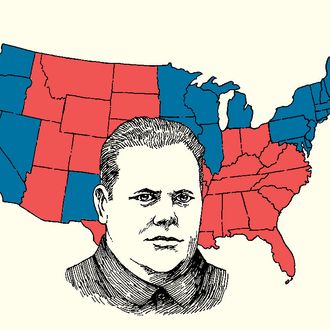
Dean Chambers, creator of UnskewedPolls.com and titular leader of the movement that insisted the polls had to, just had to be wrong, had a rough night on Tuesday. Not only did his projection of a Romney win prove incorrect, but he was forced to concede defeat to Nate Silver, a man whom he’d dissed as “thin and effeminate” and a “poster child for the New Castrati.” We called a humbled Chambers the day after the election to discuss his poll-adjusting methodology and the future of unskewing.
Your website, Unskewed Polls, claimed that it was “erasing the bias” in the major polls by adjusting results to show much more favorable outcomes for Mitt Romney. You turned out to be wrong on Election Day. Why did you miss by so much?
The whole notion of the polls being skewed and unskewing them was a belief that they were oversampling Democrats. The majority of the polls that were quote-unquote skewed were around 6 percent more Democrat than Republican. Many of us believed that the electorate was going to look more like 2010 rather than 2008. We just turned out to be wrong in that belief or assumption or prediction, whatever you want to call it.
Why did you assume that this election would be more like 2010 than 2008?
Polls showed, supposedly—and you have to even question this part of it—showed Republicans supposedly following the election more closely than Democrats, and were more enthused about the election than Democrats.
So you were extrapolating from polls that showed an enthusiasm gap?
Right. You know, what it really still comes down to is one can either look at a whole lot of information and try to make some calculation or set some probability of it, or one can just make an educated guess on whether you think the electorate is going to be, say, 35 percent each of Republicans and Democrats, or you think it’s going to be 39 percent Democrats, 36 percent Republicans.
Looking back at the election and the way it turned out, were your projections just wishful thinking?
I know that if I wanted to put out a projection of what I personally wanted, then, you know, Romney would win by a landslide, with over 400 electoral votes. But I knew that wasn’t going to happen—my final prediction was 275 to 263. If any of that came into effect, it was in the states that were truly toss-ups, like Colorado. I almost moved Colorado over to Obama at the last minute, but then I thought, It’s so close in the polls, I think there’s going to be at least a little bit of enthusiasm going in the direction of Romney, and that will put him over the top. That didn’t happen.
You’ve written that you think some recent government unemployment numbers have been suspicious. Do you distrust official numbers in general?
There was a story back in the nineties that I heard either on Rush Limbaugh of G. Gordon Liddy—and this is one of those things that if you trust that it’s real, you have to trust the person telling the story—where it was believed Paul Craig Roberts [an assistant treasury secretary under Reagan] had some knowledge of how to calculate unemployment rates or economic growth in such a way that it made the economy look better than it was. And as I understand the story, one of Clinton’s economic advisers wanted to meet with Roberts and gain some information on doing that. Since I heard that, I’ve been kind of skeptical of the reported government measures for things like unemployment. I think we’ve been fed some pretty inaccurate numbers on those things.
Are you going to “unskew” the polls in future elections?
After this, I think the only time I may raise an issue is if it’s a poll that I know is extreme. If I look at a poll and the sample is plus-5 percent Democrats, you know, after this situation, I’m not going to question that.
So if you won’t be unskewing many polls, will you still call your site Unskewed Polls?
Three months ago, Unskewed Polls didn’t even exist. It wasn’t really what I was doing. It just quickly got a lot of attention because a lot of people did perceive the polls to be wrong, and I guess wanted someone else to validate that perception by saying: Here’s how the polls are wrong, and here’s how they’re skewed, and, by the way, I’m going to unskew them. That got their interest.
See Also: Frank Rich on the GOP’s Denial Problem





























